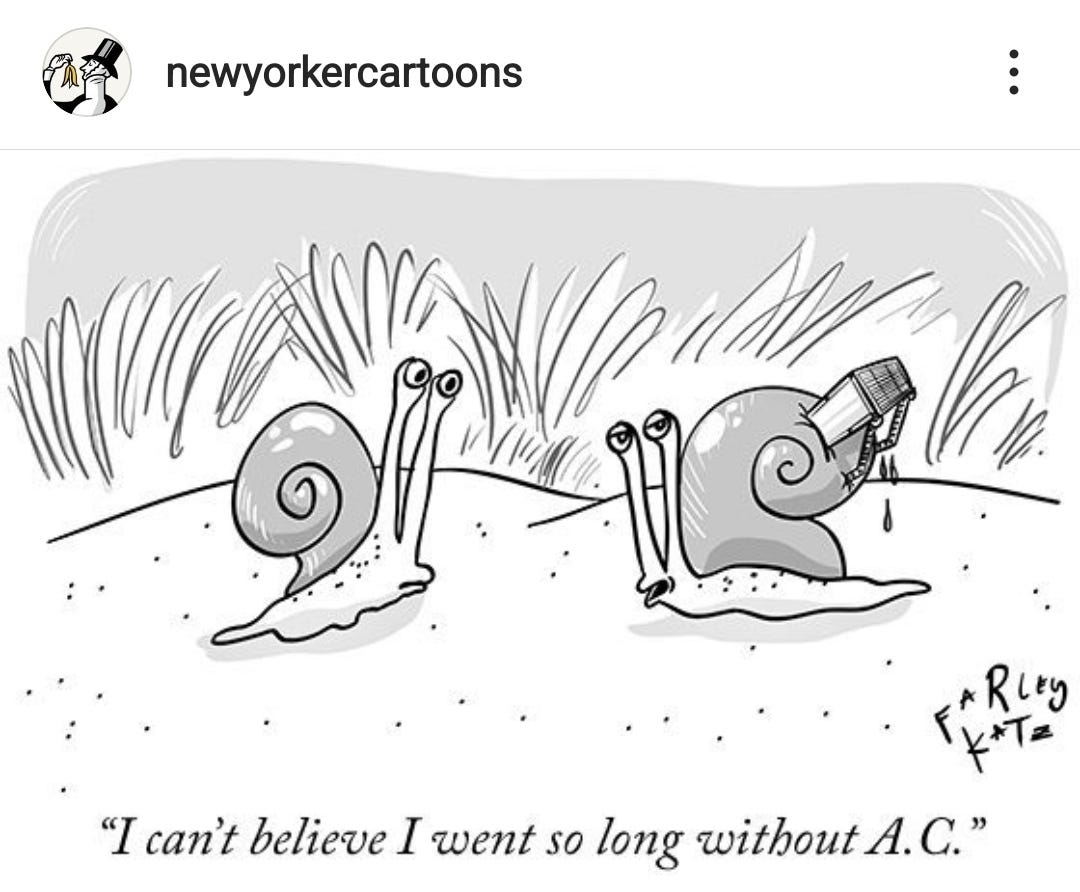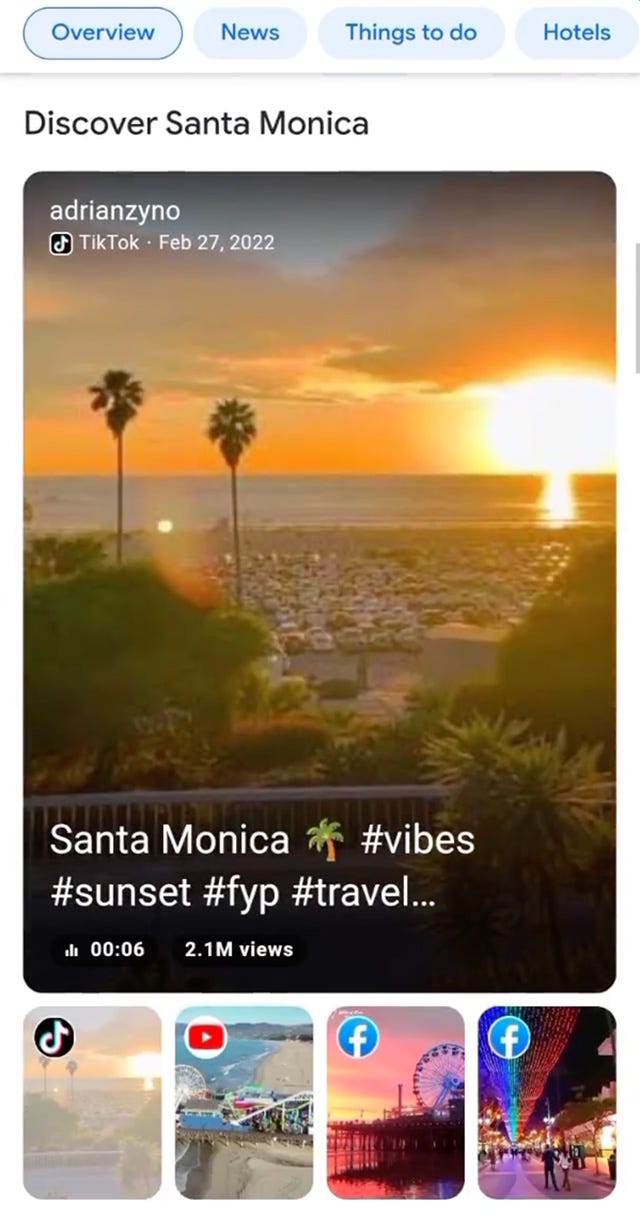No. 125: 📺 Netflix Picks Microsoft for Ads
+ 👊 TikTok Threatens Google, DELLI + DALL-E, GM's EV charging
Hello,
Welcome! I hope you’re staying cool out there. 🥵️
I’ve been trying to tell my American colleagues how hot it’s about to get here (40 degrees! That’s like 300 in your dog-year temperature scale!); they greet the news with a breezy indifference that brings brief respite from the brain-boiling calefaction.
Apparently, it’s not even that hot. But when I mention our inadequate infrastructure - no A/C, not even an ice dispenser - they recoil, and rightly so.
🎂 I have also recently realised that hi, tech. has now been going for three full years. Three years of this - can you imagine?
Like Alexander weeping that no lands were left for him to conquer, I wonder if there are any puns out there I have not yet discovered.
But let’s hope so, because we’re not stopping anytime soon.
They say you need to go for about seven before you get your big break, so we’re almost halfway there. Just another four years and success will be ours.
If you want to nudge success onto the horizon a little bit earlier, consider telling someone about hi, tech. It’s “middle-brow entertainment for the tech-curious” - that’s how I’d sell it to them. 👇👇
First, an opportunity
I’m working for Columbia Business School these days. In particular, we’re working on all-new versions of their MBA and MSc courses.
As part of the new programs, we want to have more partnerships with businesses.
And that’s where *you* might come in!
Please take a look at this short document to see the requirements, and what you’ll receive in return for your collaboration.
We’re looking for businesses of all sizes, so long as they can share some aggregated details of multi-channel marketing campaigns.
And do note: we’re also open to working with marketing agencies. We have a couple of those signed up already.
If interested, contact me and Prof. Jerath (our emails are in the document).
Thank you!
Netflix Partners with Microsoft
After months of rumours and counter-rumours, Netflix has decided to partner with Microsoft for its upcoming, ad-supported subscription plan.
Most industry observers (hi, tech. included) assumed they’d go with Google or Comcast in the end. They were the boring choices, but they were safe and likely profitable.
Now, I know what you’re thinking: Choosing Microsoft is hardly exciting, either. Yet this choice does have the merit of being somewhat unexpected and it should make Microsoft more of a force in digital advertising.
Why is that good?
Well, it is staple hi, tech. fare to state that digital advertising is stale. If you’ve ever worked in the industry, you’ll know what I mean. The creative is dreadful, the measurement misleading, and the talent pool as shallow as a crêpe pan.
If Netflix went with Google, Google would roll these ads in with its Performance Max campaigns. There would be little incentive to innovate; just an opportunity to add more inventory.
Microsoft does have incentive to make these ads stand out. It has been left behind in digital marketing - notably in video ads - but Netflix has the creative clout to devise new ways of conversing with audiences.
Netflix currently runs on Amazon Web Services. If it switches to Azure, that opens the possibility of using Microsoft’s computer vision and NLP to match Netflix content with ads. Since Microsoft does not “own” an ecommerce experience of its own, there should be opportunities for API partners here too. In turn, Google and the other giants will have to respond with innovations of their own.
Further down the line, Microsoft may end up buying Netflix to reignite the old rivalry with Apple. That would lead us into less intriguing territory.
For now, let’s enjoy the possiblity of a creative alternative in digital marketing.
“Gen Z Prefers TikTok to Google Search”
Google raised a few eyebrows this week by announcing that about 40% of young people use TikTok or Instagram to search, rather than Google’s search engine.
Predictably, once eyebrows descended, everybody started writing about it:
Including hi, tech., naturally.
But what’s really going on here?
It was Prabhakar Raghavan, head of Google’s Knowledge & Information organization, who revealed this statistic. He said it comes from Google’s internal research.
Google only reveals the details of internal research when the results are highly flattering. “This just in: 101% of Americans think Google is awesome”, that sort of thing.
There are no accidents, so my hunch here would be that they want to convey a message to all the regulators out there. In other words: “Google’s already under threat, no need to take further action.”
The statistic itself is not surprising, after all. The shift to social media for everything from news to ecommerce is already well underway. It’s certainly true that younger generations are finding more of what they want and need on TikTok.
Raghavan used the specific example of finding somewhere to eat lunch. I tried this out on the three platforms to see which fared best:
Google gives me some review articles and then a local map, which is certainly handy.
Instagram goes for photos, although the London link is unclear. It has a few video reviews of local taquerias, too.
And then TikTok goes all-in on videos, as you’d expect.
However, this falls into a generational trap from the outset.
I have entered a particularly Google-y search. When I think of searching for a lunch option, my (now trained) instinct is to type the otherwise unnatural phrase “tacos london”.
The Instagram and TikTok results aren’t that useful if I want a taco *right now* (which I did and do). However:
They could certainly improve in that area, if they wanted.
This isn’t really what “searching” on social media means. It is more about “browsing” and picking up ideas over time, some of which are saved to the user’s account.
And it is the latter point that truly worries Google, I believe. Disruption attacks the basis of a company’s competitive advantage; therefore, building a slightly better search engine is unlikely to displace a company like Google. Changing the nature of online discovery is another matter, however.
Google indexes TikTok videos and just this week, it has started testing TikTok Stories within the Google Discovery feed. If you can’t beat them, I suppose.
One wonders whether Google (specifically, with YouTube Shorts) and Meta are jockeying for position, in the expectation that a TikTok clampdown is on the way? If it is controversial to move data from the EU to the US, for how much longer will regulators permit TikTok’s Chinese HQ to access to our data?
So perhaps this was a message to the regulators who are currently assessing Google’s monopoly. Perhaps it was a rare slip of the tongue from a notoriously guarded corporation.
Either way, it revealed an uncomfortable truth about the importance of search engines in the future of online discovery.
Speaking of Google 🙈
They’ve been outsourcing their data labelling to non-native English speakers and it has led to all manner of mistakes:
I wrote ages ago about how labour-intensive data labelling is, and why that (depressingly) gives China an advantage.
I finally got access to DALL-E 2 🎨
And I’ve been using it wisely.
This one is “Baudelaire watches TV for the first time”:
He looks like he’s watching Microsoft’s new ads on Netflix.
And here’s a puffin discovering electricity:
Or how about a one-line drawing of a Maltese dog eating spaghetti?
Incidentally, I’m intrigued by this new business called DELLI.
I didn’t know all too much about them until I was asked to provide some comments for a newspaper article about the company, at which point I suddenly became an expert.
It’s a platform where you can buy and sell home-made food. It has some social media-style features too, so you can create “drops” for new products you want to sell.
More to come on that one in the coming weeks, I hope. It might be my chance to set up Clark’s Classics as a real business. If you follow me on Instagram, you’ll get the reference.
Tech Bites
GM is building a 'coast-to-coast' EV fast-charging network - Engadget
FIFA to stay on the ball with AI tech for offside detection - Silicon Republic
A mere 20% of Americans trust TikTok with their data - Media Post
Introducing Inner Monologue for robots - Twitter thread
Stay chill. 🥶️












